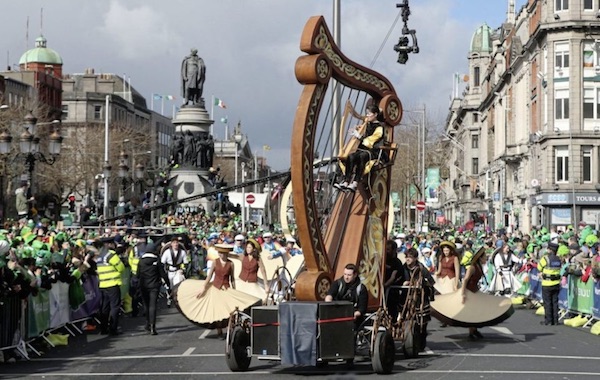
All St Patrick’s Day parades in Ireland have been cancelled in a bid to curb the spread of the Coronavirus. After weeks of delay, the news was leaked ahead a meeting of the acting Cabinet in Dublin on Monday. Multi-party meetings to deal with the crisis have also been announced.
The last time such a course of action was followed was during the outbreak of Foot-and-Mouth, a cattle disease in 2001. Other major St Patrick’s Day events are expected to be cancelled across Ireland in due course.
A total of 33 cases have so far been diagnosed of the disease, which is showing early signs of taking hold in both parts of Ireland.
Acting Minister for Health Simon Harris said the coronavirus outbreak in the country was becoming “very serious”. He said there was a moderate to high risk it could follow the trajectory experienced in other European nations, such as Italy, where 366 people have already died.
While the cancellation announcements have been seen as inevitable, criticism continues of Ireland’s low-key approach to the crisis. In particular, there has been no attempt to utilise our island geography as has been the norm for previous disease outbreaks.
The efforts of medical officers to reassure the public have served only to increased public anxiety. Public announcements have been laced with buzzwords and bluster to play down the severity of the disease. One saw a simplistic stick-figure justification for disregarding close contacts with infected individuals for less than 15 minutes, a measure which is intended only to reduce government expenditure.
A low level of intervention has been the order of the day across most European nations in comparison with China, where the disease began but is now coming under control.
Rather than seeking to contain the Coronavirus, the Dublin government’s approach, in common with most other western nations, has been to view the epidemic as inevitable but comparable to a severe flu season. The goal has been to support the health system and economy through a high but “acceptable” number of deaths.
In Britain, British Prime Minister Boris Johnson even declared pre-emptive measures such as stopping large events “don’t work as well as people think”, suggesting instead to take it “on the chin, take it all in one go and allow the disease to move through the population without really taking as many draconian measures”.
Strong on economics, but low in science and devoid of compassion or common sense, the strategy has backfired with disastrous consequences in Italy, where the lives of some elderly have already been sacrificed in order to lessen the burden on the health system. A quarantine area including 16 million people has now been announced in a rearguard bid by the Italian government to prevent the disease from spreading.
However, the same strategy has so far been followed in Ireland, resulting in the emphasis on continued economic activity and the long delay in taking action over the St Patrick’s Day festivals. More than 500,000 people were expected to travel to Ireland for parades and other events, and the late cancellations have meant they have been left with short notice to change their plans.
There are still no checks in place in either part of Ireland to prevent infected passengers arriving from high-risk areas, even those where quarantine measures are already in place. An initial spike in the number of outbreaks of the disease has been linked to visitors arriving from northern Italy.
In one debacle, a doctor at Cork University Hospital was repeatedly told to return to work despite travelling from a high-risk area. He subsequently tested positive, requiring the partial closure of the hospital. Virtually no details of this or other disease outbreaks have been released, which officials have insisted is for reasons of patient confidentiality.
Sinn Féin leader Mary Lou McDonald, whose family has already had to self-isolate, said that a “collective approach” was needed, and welcomed the decision to cancel St Patrick’s Day events as “responsible”.
Ms McDonald was speaking following a meeting of party leaders this evening, and revealed they would be meeting twice weekly to discuss what she said is a developing public health emergency.
“This is a situation that requires a collective and cross-party approach where party leaders lead from the front,” she said.
“It was a positive discussion and I welcome the decision of Leo Varadkar agreeing to my request to hold such meetings. We are facing a huge public health emergency that will have knock-on effects to our economy.
“We must, as a matter of urgency, develop a strategy that protects our workers as well as speeding up efforts to maximise the capacity of our health service.
“Today’s decision to cancel St Patrick’s Day parades and events was the sensible and necessary decision to make. I know there will be huge public disappointment with that decision as well as financial repercussions for many businesses. But the health and wellbeing of our citizens must be the first and foremost priority for all of us.”
![[Irish Republican News]](https://republican-news.org/graphics/title_gifs/rn.gif)
![[Irish Republican News]](https://republican-news.org/graphics/title_gifs/harp.gif)

